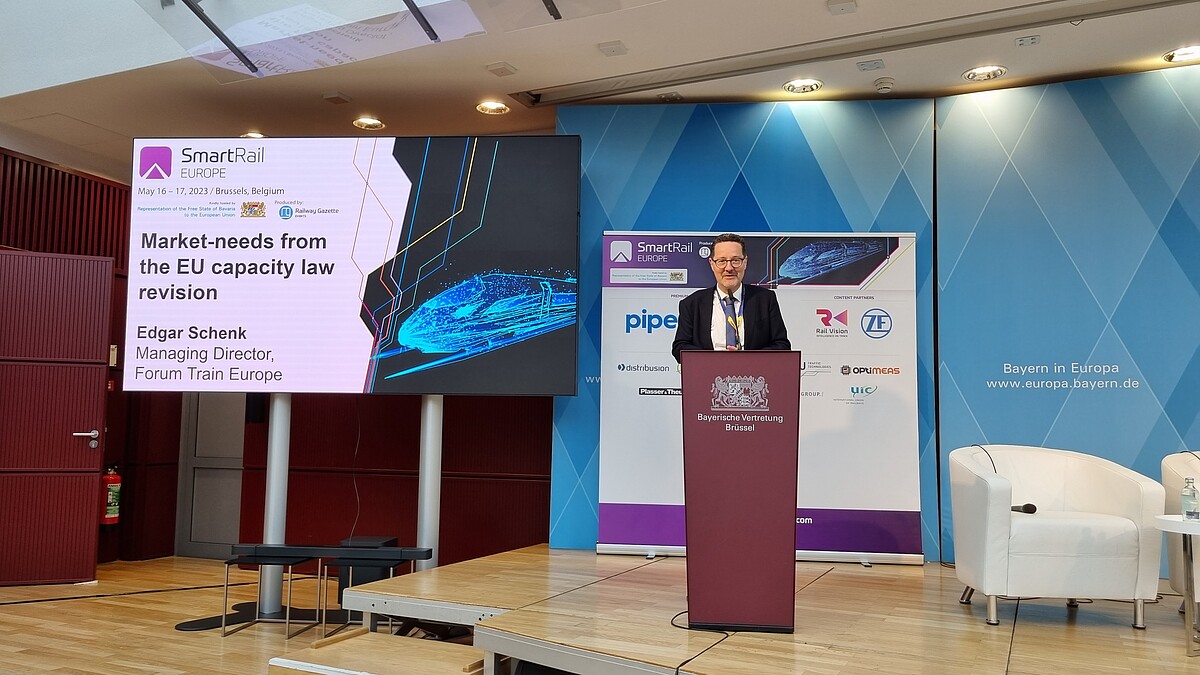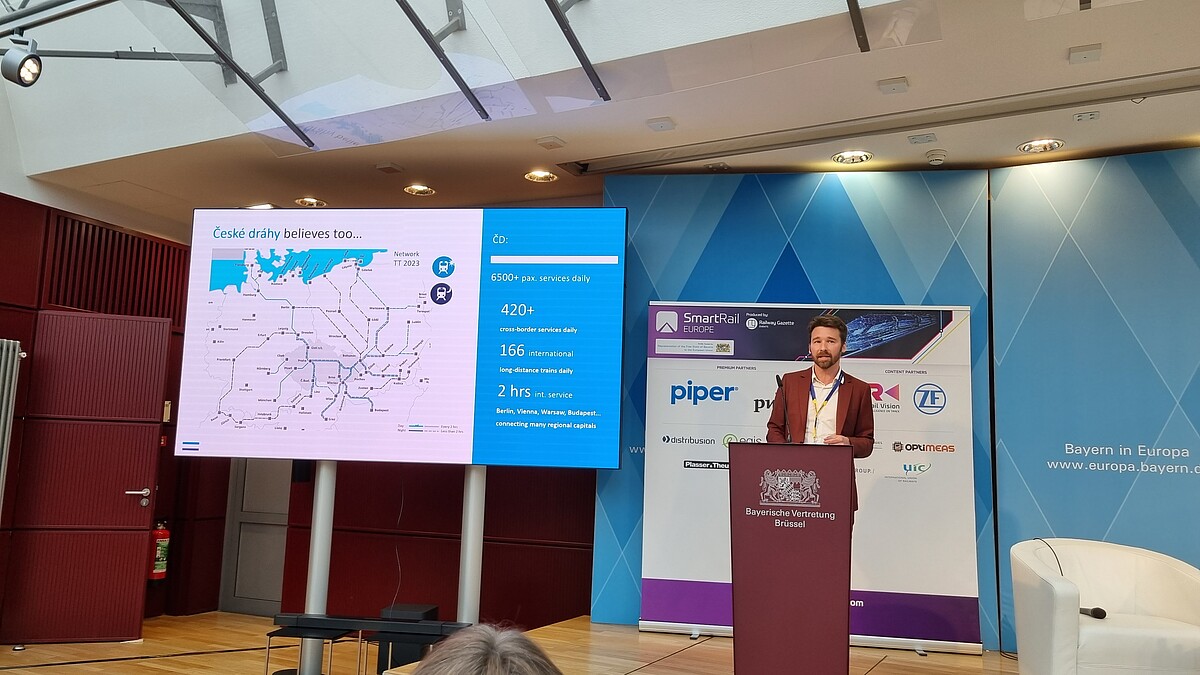On the 16th and 17th of May, FTE attended the SmartRail conference in Brussels, organized by Railway Gazette. This conference, hosted by the Bavarian representation to the European Union, included presentations and networking opportunities with leaders in the European rail sector, including representatives from government, business, and NGOs. Some notable participants included FTE member České Dráhy, the European Commission, ALLRAIL, CER, the ASTOC, and more
The SmartRail conference was kicked off with keynote speaker Kristian Schmidt, director for Land Transport at the European Commission’s Directorate General for Mobility and Transport (DG MOVE). Schmidt spoke about the state and challenges of the railway industry today, and the way towards a modal shift in Europe.
In his presentation, Schmidt highlighted the four main priorities for DG MOVE and the European Commission when it comes to rail:
- New Infrastructure (TEN-T Regulation)
- Improving the usage of infrastructure (capacity management)
- Improving ticketing (introducing a multimodal ticketing package)
- Technical specifications for interoperability
Priority number two (managing capacity on European railway infrastructure) is precisely the area in which FTE members and the FTE office are working to improve. This set the stage for FTE managing director Edgar Schenk’s subsequent presentation about FTE and improving European capacity management.
In his presentation: Market-Needs from the EU Capacity Law Revision, Edgar Schenk discussed some of the major problems that FTE and its members work to solve and highlighted the crucial opportunities that revision of the European law related to capacity management (Greening Transport Package) creates in regard to these problems.
Late and unreliable planning of TCRs:
First among the topics discussed is the poor and uncoordinated planning of temporary capacity restrictions (TCRs). This has a myriad of consequences on FTE members and their customers, including late ticket sales, unreliable freight service, higher costs, and wastage of capacity. These issues ultimately lead to suffering customer satisfaction, loss of profit, and a decrease in the attractiveness of rail compared to other modes.
Missing European view and coordination:
Another of the central issues facing the railway market is the overwhelmingly national character of railway infrastructure, policy, planning, and coordination. This causes wasted capacity and losses on investments, an inability to operate efficient and competitive cross-border freight service, bottlenecks, and more. Moreover, the lack of adequate Europe-wide rules and regulations means coordination is completely dependent on sector-consensus.
Incompatible patchwork of national markets and policies
Related to the previous problem is the issue of network incompatibility between different European countries. Unharmonized traffic management, technical specifications, vehicle requirements, safety standards, and other policies lead to higher administrative burdens on railway undertakings (and their customers) than there otherwise should be to run cross border services. Despite continuous efforts by the sector for harmonization, these issues remain serious barriers due to a lack of sector-independent regulation.
Rigidity and instability of annual timetables
The current process for planning the annual timetable is antiquated, highly inflexible, and does not meet the market needs of the 21st century. The usage of artificial planning periods results in allocation which is far too late for passenger operators (which must compete with the early ticket sales of planes and buses), while simultaneously being too early for freight operators (whose customers require maximum flexibility for the transport of their goods).
To all of the above issues there are solutions which require the combined efforts of the entire sector to solve. These solutions include the introduction of financial incentives for infrastructure managers, regulations requiring the minimization of TCR impact on customers, enforcement of harmonization and multiannual budgets, making EU funding conditional on the necessary coordination, sector-independent governance supervision, restructuring the capacity allocation process, and more.
A throughline to all of these potential solutions is stronger Europe-wide frameworks and regulations to promote sector-defined rules and norms, and therein lies the opportunity created by the revision of capacity management-related EU regulations.
It is important to note that Forum Train Europe does not participate in any form of lobbying to the EU or national lawmakers, instead, it provides the platform for railway undertakings, service companies, and freight forwarders to align among themselves on these crucial issues as they are discussed by the EU and the sector.
FTE member České Dráhy, represented by Jan Ilik, built on the points of Edgar Schenk in the presentation: Connecting Europe’s Cities: RU’s Experience and challenges. Ilik similarly talked about many of the problems facing the market from an RU perspective. This included both non-capacity management related points such as ETCS deployment and backwards compatibility of infrastructure, and a major issue which is relevant to the work of FTE: the lack of multiannual capacity commitments.
Ilik highlighted the fact that RUs must invest very large amounts of money (sometimes even in the billions) in the rolling stock, personnel, maintenance, access charges, etc. to run on routes which, due to the annual nature of timetable planning in Europe, are often only stable for one year. Long-term and high investment requirements for an inherently instable marketplace places a considerable burden of risk on railway undertakings, who, as the only true market players in the sector, often have the lowest capacity to bear such risk.
Ilik’s presentation highlighted the opportunity of multiannual framework agreements between railway undertakings and their respective infrastructure managers as a means of generating a more business and investment-friendly environment. As a general conclusion, Ilik emphasized the need for predictability in timetable planning and capacity allocation, and that this starts with clear rules and norms.
Forum Train Europe sincerely thanks Railway Gazette and the representation of the Free State of Bavaria for hosting this exciting and productive conference. For more information on the market needs of the railway sector, FTE positions can be found on our website. The two above mentioned presentations can be downloaded below, while others are on the organisatior´s website.


